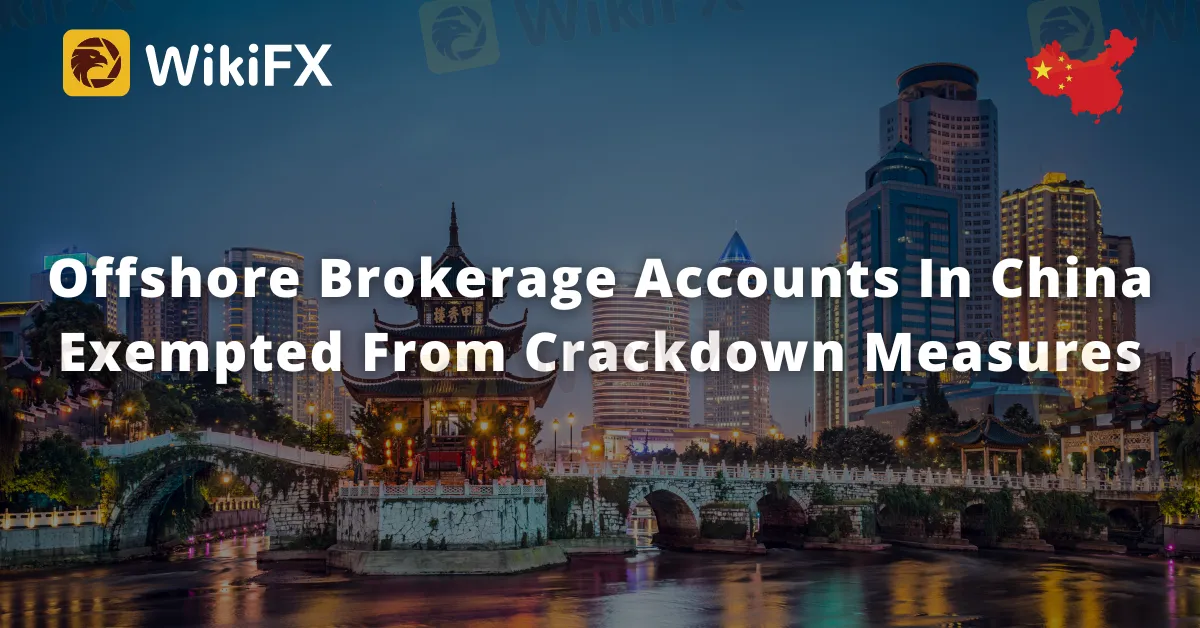简体中文
繁體中文
English
Pусский
日本語
ภาษาไทย
Tiếng Việt
Bahasa Indonesia
Español
हिन्दी
Filippiiniläinen
Français
Deutsch
Português
Türkçe
한국어
العربية
Offshore Brokerage Accounts In China Exempted From Crackdown Measures
Abstract:China's securities regulator, has declared that mainland investors who currently have offshore trading accounts would be able to continue their activities. The ruling comes as the SEC intensifies its control of illicit cross-border brokerage services offered by domestic securities companies' offshore operations.

The China Securities Regulatory Commission (CSRC), China's securities regulator, has declared that mainland investors who currently have offshore trading accounts would be able to continue their activities. The ruling comes as the SEC intensifies its control of illicit cross-border brokerage services offered by domestic securities companies' offshore operations.
The CSRC stressed in a statement made on Wednesday that it is working to correct brokerage services given by offshore divisions of domestic securities companies that breach the country's capital regulations. However, existing offshore accounts will not be restricted as long as they comply with the government's foreign exchange (FX) laws.
The new policy comes in reaction to Hong Kong brokerages' recent suspension of accounts for mainland Chinese clients, which came after Beijing pledged to tighten its monitoring of unlawful cross-border activity. China has been cracking down on unlawful activity in the securities market, and the CSRC ordered Futu Holdings Ltd. and Up Fintech Holding Ltd. to suspend their “illegal” activities and stop accepting new onshore investors in December. The disclosure wiped away billions of dollars in market value and forced Futu to postpone its Hong Kong debut.

Following the news, Futu Holdings and Up Fintech Holdings saw 10% increases to premarket session highs in the United States on Wednesday.
China forbids its citizens from using their $50,000 yearly foreign currency allotment to buy stocks and insurance abroad. However, many mainland Chinese have flouted the regulation by creating accounts outside of the country's boundaries. Some brokerages in Hong Kong have been operating in the shadows, enabling millions of Chinese investors to avoid capital regulations.

While the current declaration by the CSRC may provide some comfort to mainland Chinese investors who already have offshore trading accounts, it also underlines the Chinese government's continuous attempts to regulate the securities market and implement capital restrictions. China's regulatory policies have far-reaching implications on the global financial market as the world's second-largest economy, and it is critical for investors to remain up to speed on the latest changes in the country's financial sector.
Install the WikiFX on your smartphone to stay updated on the latest news.
Download link: https://www.wikifx.com/en/download.html?source=fma3

Disclaimer:
The views in this article only represent the author's personal views, and do not constitute investment advice on this platform. This platform does not guarantee the accuracy, completeness and timeliness of the information in the article, and will not be liable for any loss caused by the use of or reliance on the information in the article.
Read more

MultiBank Group Wins Big at Traders Fair Hong Kong 2024
Discover how MultiBank Group, a global leader in financial derivatives, secured three prestigious awards at Traders Fair Hong Kong 2024, highlighting its innovative trading solutions and industry excellence.

CySEC Settles Compliance Case with Fxview Operator Charlgate Ltd
Discover how CySEC resolved compliance issues with Charlgate Ltd, the operator of Fxview, through a €50,000 settlement. Explore the investigation, regulatory measures, and CySEC's new website designed for improved accessibility and transparency.

TradingView Launches Liquidity Analysis Tool DEX Screener
Discover TradingView's DEX Screener, a powerful tool for analyzing decentralized exchange trading pairs. Access metrics like liquidity, trading volume, and FDV to make smarter, data-driven trading decisions.

WikiFX Review: Is PU Prime a decent broker?
In today’s article, we have made a comprehensive review of a broker named PU Prime. We wonder if PU Prime is a scam or a reliable broker.
WikiFX Broker
Latest News
Geopolitical Events: What They Are & Their Impact?
Volkswagen agrees deal to avoid Germany plant closures
Top 10 Trading Indicators Every Forex Trader Should Know
WikiEXPO Global Expert Interview: Simone Martin—— Exploring Financial Regulation Change
TradingView Launches Liquidity Analysis Tool DEX Screener
MultiBank Group Wins Big at Traders Fair Hong Kong 2024
'Young investors make investment decisions impulsively to keep up with current trends' FCA Reveals
Why Do You Feel Scared During Trade Execution?
CySEC Settles Compliance Case with Fxview Operator Charlgate Ltd
Malaysian Influencer Detained in Taiwan Over Alleged Role in Fraud Scheme
Currency Calculator


